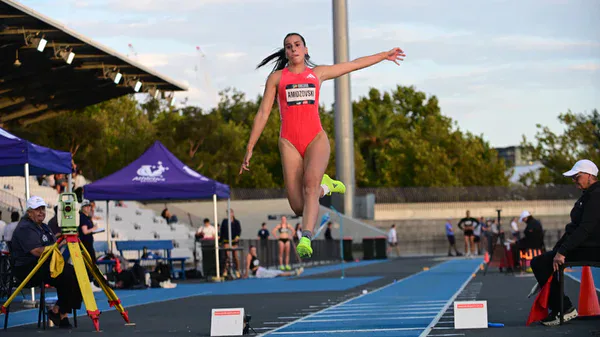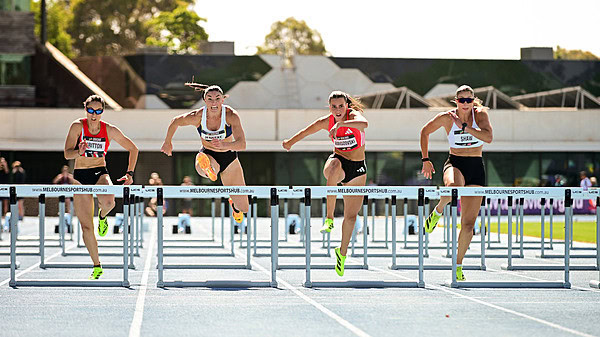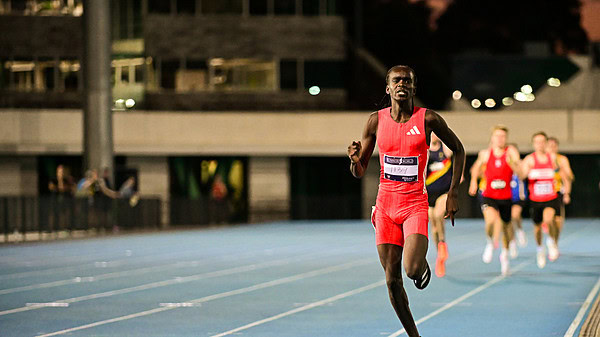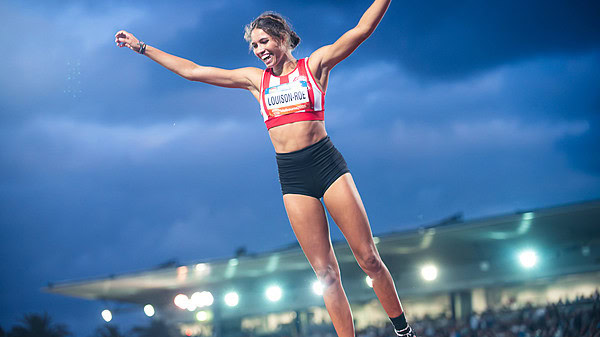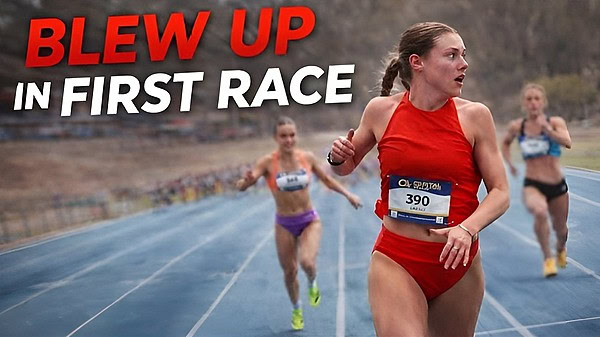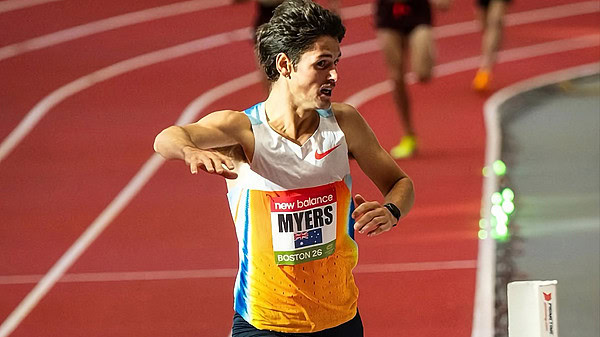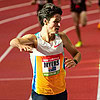The qualifying list for the Olympics has been updated for the final time.
The qualifying period – during which athletes qualify by either reaching an entry standard or being the next top athletes based on their World Ranking – ended on 30 June.
World Athletics has updated its Road to Paris website as at the close of the qualifying period and has now updated it for a final time, after some nations did not select all eligible athletes. Few Australians were in action last weekend of the qualifying period, with many National Championships being held. The performances in those events were the last ditch efforts that has seen some Australian athletes displaced from the quota positions, but some have regained those places in the ‘rolldown’ process.
There’s 6 events (the women’s 800m, men’s and women’s 1500m, women’s 5000m, men’s high jump and men’s 20km walk) where there are more Australian athletes within the quota positions than places available, which requires Athletics Australia’s selectors to make choices, based on an entirely discretionary selection policy.
Here’s the run down of Australia’s qualified athletes and those who are narrowly outside the quota:

100m
After originally missing the quota by one position Rohan Browning has snuck back in in 54th place for the 56 man field. Josh Azzopardi narrowly missed the cut.
Ella Connolly has qualified by world ranking, finishing in 52nd position. Bree Masters originally narrowly missed the quota, by one position and 2 world ranking points, but after the roll down process ended up in 52nd. National record holder Torrie Lewis finished ranked 65th after prioritising the 200m after the end of the domestic season.
200m
Calab Law finished safely inside the quota based on his world ranking, in 32nd for the 48 man field.
Torrie Lewis is ranked a strong 23rd while Mia Gross maintained her position in the quota, clinching the final spot by 2 world ranking points and then being bumped up to 41st place after the roll down (field of 48 athletes).

400m
Reece Holder recorded the entry standard last year and has shown similar form in Europe, while Ellie Beer finished inside the quota on rankings, ranked 34th for the field of 48.
800m
What would have been a headache selection now doesn’t appear to be in the men’s 800m with national champion Luke Boyes missing the 45-strong quota by one position and 10 points on the original list, and then by slightly more with three universality athletes being added to the field. Olympic 4th placegetter Peter Bol is already selected and national record holder Joseph Deng and junior star Peyton Craig have recorded the entry standard for the event.
Catriona Bisset and Bendere Oboya have met the entry standard, with one of them to be selected to fill the final place after Claudia Hollingsworth and Abbey Caldwell were selected after the national championships. Both Bisset and Oboya have shown good form in Europe, with Bisset marginally faster but having finished one place behind Oboya at the Australian Championships. There are a multitude of factors that selectors will need to consider in making their decision.

1500m
There’s four men with the entry standard but only three places in the team. In the only selection to leak before being officially announced, Olli Hoare, Adam Spencer and Stewart McSweyn will line up in Paris, with junior Cameron Myers missing out.
Argument could have been made in favour of any of the four and more frequent racing over the mile than has occurred in the recent past means the need to interpret performances for comparisons.
- Australian record holder and Commonwealth Games champion Olli Hoare has the fastest 1500m during the period and finished second at the Australian Championships.
- Former Australian record holder Stewart McSweyn is also qualified in the 5000m with a sub-13 minute run. His post-nationals form has been stronger over 5000m than his 1500m running has been (but still recording a 3:35 clocking). McSweyn finished 4th at Nationals.
- National champion Adam Spencer was Australia’s top finisher at last year’s world championships, making the semi-finals. His post-Nationals form hasn’t been fast, instead focused on the NCAA Championships where he placed 3rd in a tactical race.
- 18-year-old Cameron Myers has the fourth fastest mark during the qualifying period but the second fastest post-nationals performance, approaching his PB with a 3:33.93 run. He was 5th at the Australian Championships.
- Bronze medallist at the Australian Championships, Jesse Hunt, did not finish within the quota, placing 50th for the 45-man field based on his world ranking.
Jessica Hull is already selected in the women’s event, leaving 2 remaining positions from among the four women who have men the entry standard: Linden Hall, Georgia Griffith and Sarah Billings.

Georgia Griffith finished second at Nationals and has the second best season’s best and qualifying performance from the remaining trio, running a new personal best of 3:59.04.
Linden Hall was the national record holder at the end of last season with her 3:56.92 run. She has run 3:58.96 this European season and was third at Nationals.
Sarah Billings finished fourth at Nationals before slashing her personal best overseas. She’s also run under 4 minutes with a 3:59.59 in a race where she beat both Hall.
5000m
Stewart McSweyn and Morgan McDonald have met the entry standard and look set for selection (assuming McSweyn is intending on running the event, having also qualified in the 1500m). National 10000m record holder Jack Rayner finished outside of the quota in 46th for the 42-person field, and did not obtain a roll down position.
The women’s event is the most oversubscribed of any for Australia, with 7 athletes eligible to be selected. That number reduces to 6 with Jessica Hull publicly stating that she is only seeking selection in the 1500m.
New National record holder Rose Davies and Isobel Batt-Doyle have both reached the entry standard, while sub-15-minute runners Jenny Blundell (32nd) and Lauren Ryan (37th) as well as Holly Campbell (35th) and Maudie Skyring (41st) finished within the quota based on their world ranking. Natalie Rule (43rd) narrowly missed the quota. Aside from their world rankings, here’s a few quick stats with reference to those in contention for selection:
- Rose Davies: National champion, Australian record holder, fastest time in qualifying period (14:41.65)
- Isobel Batt-Doyle: 4th at Nationals, second fastest time in qualifying period (14:49.75)
- Lauren Ryan: 2nd at Nationals, third fastest time in qualifying period ( 14:57.67). Already selected in the 10000m where she is the national record holder.
- Jenny Blundell: Oceania Champion and 5th at Nationals. Fourth fasest time in qualifying period (14:59.84).
- Holly Campbell: 2nd at Oceania Championships and 10th at Nationals. Sixth fastest time in qualifying period (15:09.92)
- Maudie Skyring: 3rd at Oceania Championships and at Australian Championships. Eighth fastest time in qualifying period (15:12.44).
In the updated Road to Paris listing after the roll down process Campbell and Skyring are not listed, meaning they would not be selected by Athletics Australia.
10000m
National record holder Jack Rayner is 35th for the 27 man field. 8 positions ahead of him qualified based on the ranking points they accrued at European cross country races but it would be expected that at least some will be selected by their nations, meaning the likelihood of a roll-down position is slim.
Lauren Ryan is already selected in the women’s event.
110m/100m Hurdles
Tayleb Willis finishing in 33rd position based on his world ranking, for a field of 40.
Michelle Jenneke is already selected and looks set to be joined by Liz Clay (35th) and Celeste Mucci (36th) who finished in the 40 person quota based on their world ranking.
400m Hurdles
Sarah Carli (35th) and a spree of late runs from Alanah Yukich (37th) see two Australians finish within the 40 woman quota.
No men qualified.
3000m Steeplechase
Matthew Clarke (27th) and Ben Buckingham (31st) finish in the top 40 quota places based on their world rankings and look set for their second Olympic appearances.
Amy Cashin (29th) and Cara Feain-Ryan (33rd) also reach quota positions in the women’s event.

High Jump
4 men have qualified in the quota based on their world ranking but there’s only three places available:
- Australian and Oceania Champion Yual Reath (12th) has the highest mark in the qualifying period at 2.30m
- Runner-up at Nationals and third in Oceania, Joel Baden (22nd) has jumped 2.28m this year.
- 2023 World Championship finalist Brandon Starc jumped 2.28m last European season but has only competed on three occasions since as he battles injury. Starc jumped 2.20m in May.
- Roman Anastasios (26th+) finished 3rd at Nationals but 2nd in the Oceania Championships and has recently improved his personal best to 2.25m.
Nicola Olyslagers and Eleanor Patterson have both already been selected in the women’s event.
Long Jump
Christopher Mitrevski is already selected and looks set to be joined by Liam Adcock, who finished in 28th on his world ranking for a field of 32 jumpers.
Brooke Buschkuehl is Australia’s only qualifier in the women’s event with an always safe quota position of 19th based on her world ranking.
Triple Jump
Connor Murphy looks set to follow in his father’s footsteps in becoming an Olympic triple jumper, finishing in 30th place for the 32-person field based on his world ranking. His father, Andrew, competed at the 1996, 2000 and 2004 Olympics.
Aiden Hinson missed out on a quota place in 40th.
Desleigh Owusu finished 39th ranked based on her world ranking after clinging to the final quota position until close to the end o fthe qualifying period.
Pole Vault
World champion Nina Kennedy has qualified in the women’s event while Kurtis Marschall has done likewise in the men’s.
Shot Put
No qualifiers

Discus
Matt Denny is already selected in the men’s event while Taryn Gollshewsky stayed within the quota, finishing 30th for the 32-strong field based on her world ranking.

Javelin
Cameron McEntyre finished 24th in the quota based on his world ranking while Nash Lowis narrowly misses it in 34th place.
Mackenzie Little has the entry standard in the women’s event while Kathryn Mitchell (16th) and Kelsey-Lee Barber (27th) also gained quota positions based on their world ranking. Liana Davidson finished 39th for the 32 person field.
Hammer Throw
National record holder Stephanie Ratcliffe sat one place outside the quota in 33rd place at the close of qualifying, but has been bumped to 30th in the roll down process. The US college based athlete had a late start to the season, missing the Australian Championships and the Oceania Championships, which clashed with the NCAA Championships. The lack of placing points from those two meets was the difference between being easily within the original quota, or not.
Decathlon/Heptathlon
Ashley Moloney (19th) and Daniel Golubovic (24th) stay inside the 24 person quota in the Decathlon based on their world rankings, while Camryn Newton-Smith and Tori West do exactly likewise in the Heptathlon.

4x100m Relays
Australia has qualified a team in both the men’s and women’s 4x100m relays and can selected five athletes in the squad.
If there’s an athlete selected in the 100m they must be one of the five. There’s an interesting clause in Athletics Australia’s Nomination Critiera that prioritises relay success over individual success and outlines that an athlete might not be selected in the 100m if their inclusion in the event is thought to weaken the relay squad.
That could apply to Rohan Browning (if he ends up in a quota position through a roll-down process) as he hasn’t participated in a 4x100m relay since March 2023 at the Sydney Track Classic.
In the women’s Ella Connolly has been a member of Australia’s record breaking 4x100m teams this year so shouldn’t have any impediment to selection in both.
There’s great depth from selectors to choose from with the top 10 men and women all legally running under 10.28s and 11.38s respectively.
4x400m
Australia didn’t qualify a team in any of the men’s, women’s or mixed 4x400m relays.
Marathon
Six men and women were selected in June: Brett Robinson, Patrick Tiernan and Liam Adams; and Sinead Diver, Genevieve Gregson and Jessica Stenson.
20km Walk
Kyle Swan and Rhydian Cowley in the men’s event, and Jemima Montag and Rebecca Henderson in the women’s, have already been selected.
Declan Tingay (entry standard) and Tim Fraser (world ranking, 47th+) are within the quota for the final place in the men’s team. Olivia Sandery (entry standard) can fill the final place in the women’s team.
Mixed Marathon Relay
This is a 2×2 person mixed-gender relay that covers the marathon distance. Australia has qualified two teams.
What happens next?
Athletics Australia has two days to make selection choices under the Nominations Policy and advise World Athletics of same.
World Athletics collates all of those initial entries from nations around the world and then updates the Road to Paris website one last time on 7 July, removing any athletes whose nation’s didn’t accept a quota position. Further offer of entries then roll down in order of the world rankings (while still ensuring that there are max three representatives per nation) with entries finalised by 8 July (Monaco time).
There’s also the potential for appeals to non-selection which will need to be an quick, but hopefully not expedient, process to cater for the above timelines. Under the Australian Olympic Committee By-Laws that govern appeals, Athletics Australia has to first provide reasons to a non-selected athlete on why they were not selected. In Lisa Weightman’s recent successful appeal against AA, the National Sports Tribunal found that re-quoting the selection criteria wasn’t sufficient, and that ‘[r]easons do not need to be tens of pages in length. A page or two may suffice.’
Athletics Australia President Jane Flemming has urged calm during the selection process in an open letter.
What do the selectors need to consider?
Unlike the controversial marathon team selections, where there was little criteria for the selectors to follow, for the remaining selections there are seven matters that selectors must consider (but in no particular order):
i) an Athlete’s ability to meet the objective in clause 2.3 for their specified event(s) [greatest potential to win a medal or finish in the top eight in their event(s) at the Games.]
(ii) whether an Athlete has obtained a quota place for any event under the Qualification System;
(iii) an Athlete’s ability to demonstrate high-level performance throughout the Qualification Period;
(iv) an Athlete’s ability during the Qualification Period to plan their performances to peak at a major championship;
(v) an Athlete’s participation at the 2024 Australian Track and Field Championships and the National Federation’s Summer Series in their relevant event(s). The aforementioned events should form a significant part of an Athlete’s competition plans;
(vi) an Athlete’s ability to contribute to any qualified Australian relay team in the 4x100m, 4x400m or the Marathon Race Walk Mixed Relay events.
(vii) any factor, or combination of factors that the AA Selection Committee, in consultation with the National Federation General Manger – High Performance, considers relevant.
Final Olympic selections are expected to be officially announced by Athletics Australia and the Australian Olympic Committee on Monday.


